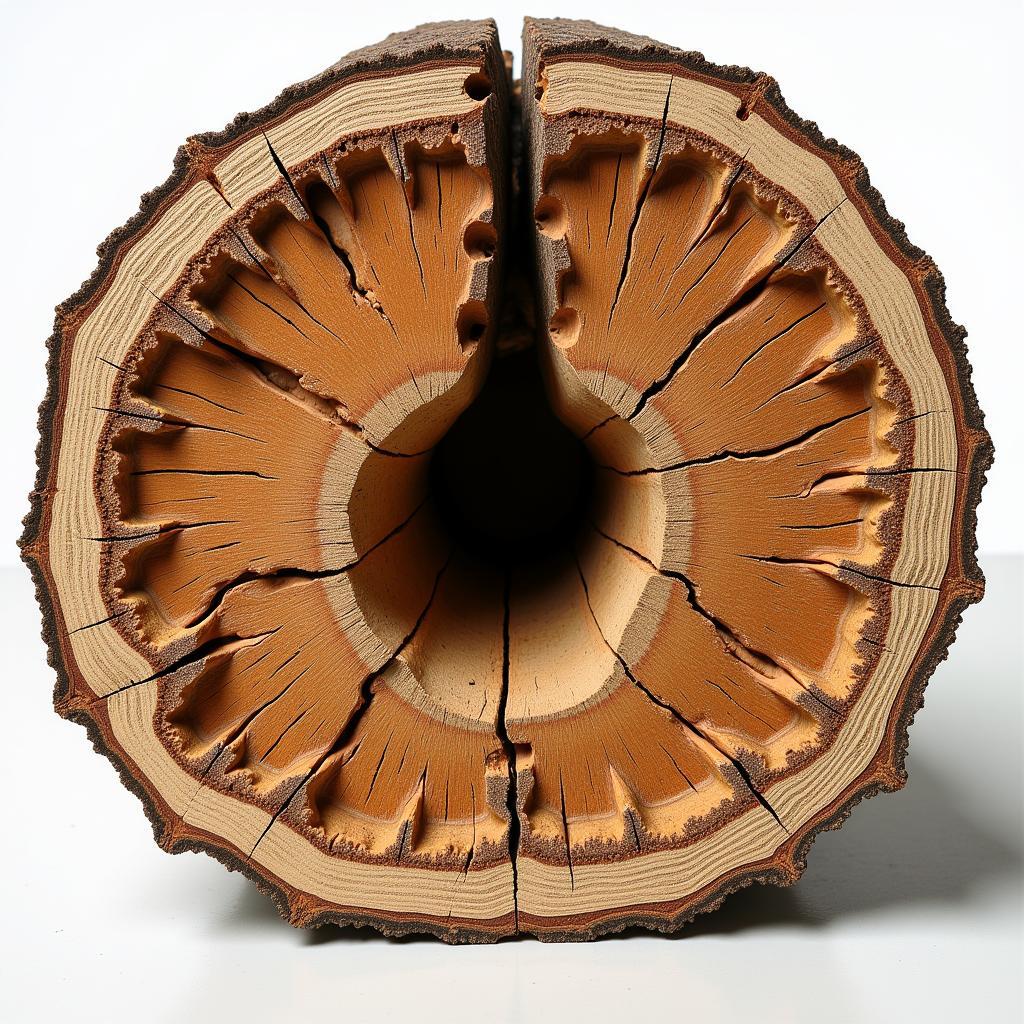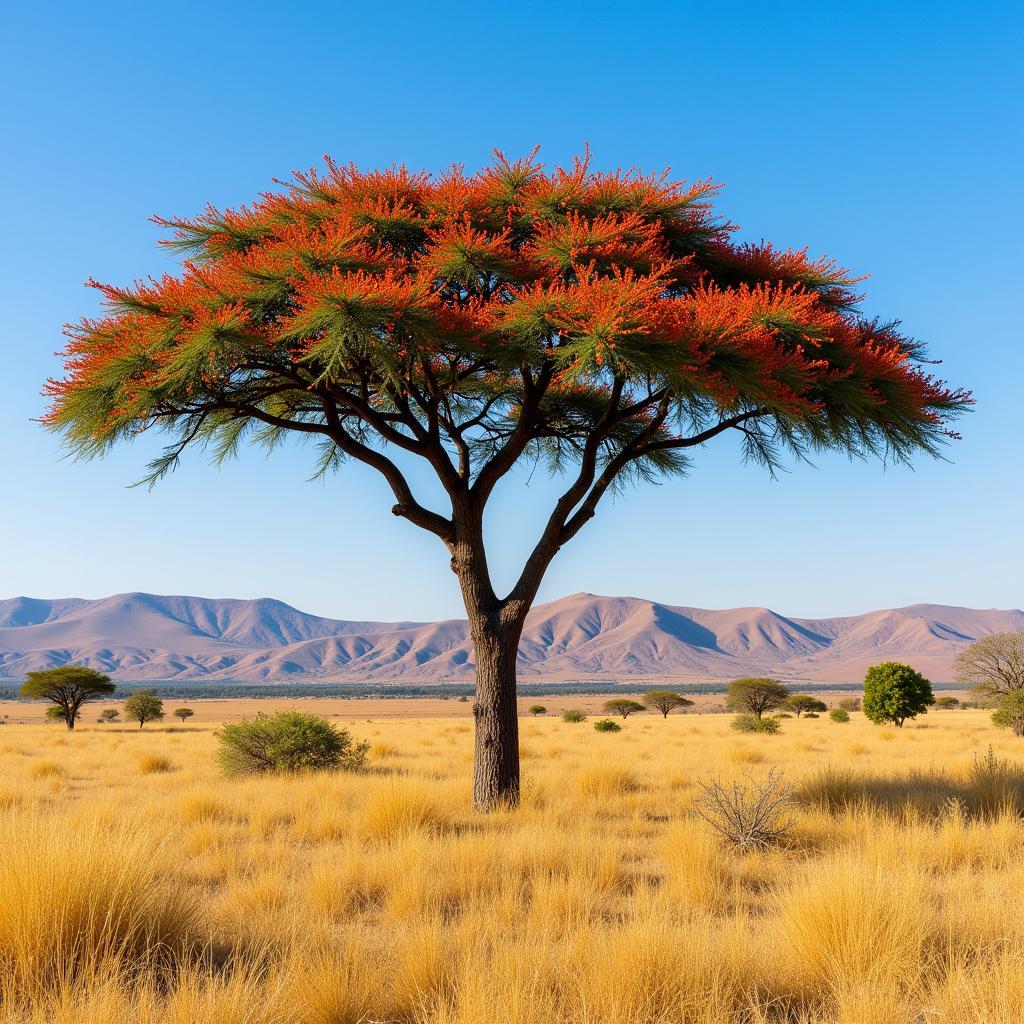Exploring the Diverse World of African Botanical Gardens
From the sun-drenched plains to the misty mountains, Africa is a continent teeming with an astonishing array of plant life. This incredible biodiversity is not only a feast for the eyes but also a source of food, medicine, and cultural significance for millions. “African Botanical Gardens” play a crucial role in preserving and showcasing this natural heritage. They offer a unique window into the diverse flora of the continent, while also serving as centers for research, education, and conservation.
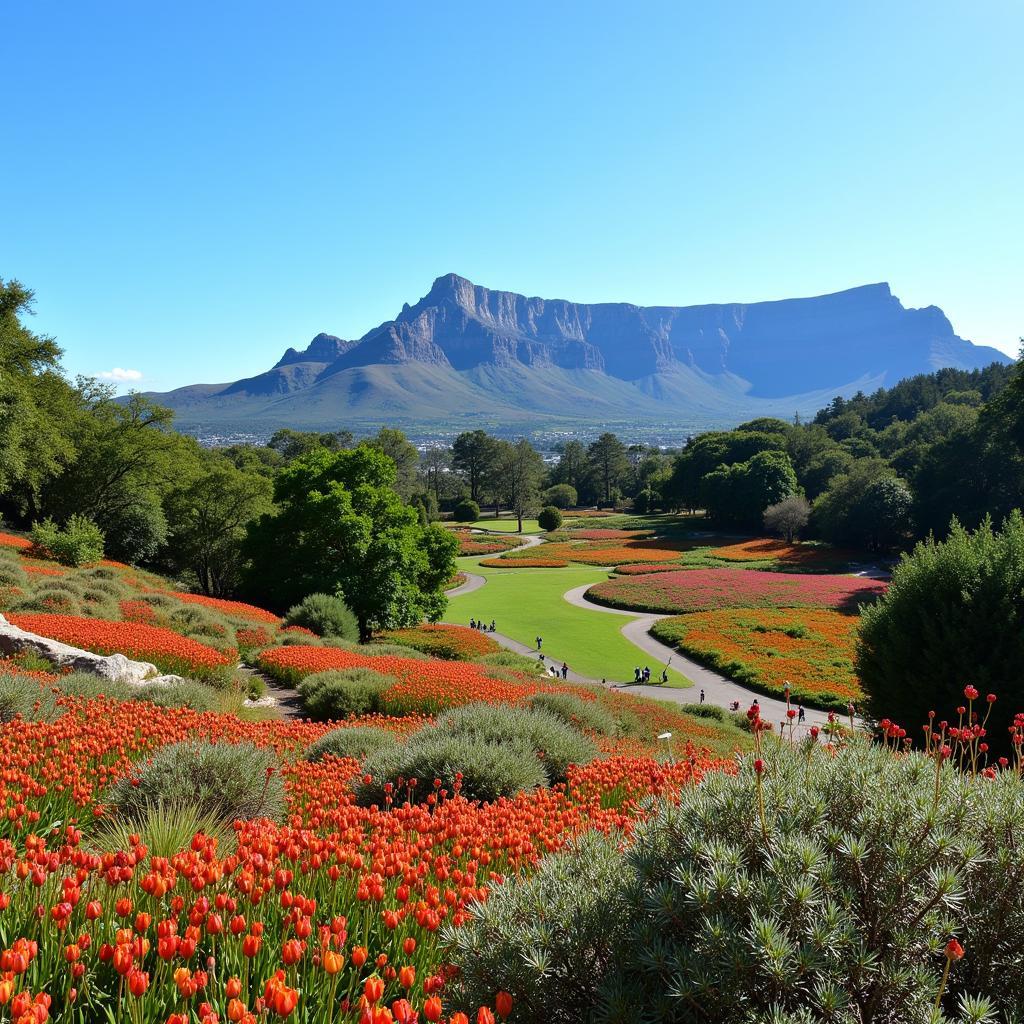 Kirstenbosch National Botanical Garden in South Africa
Kirstenbosch National Botanical Garden in South Africa
A Journey Through Africa’s Floral Paradises
African botanical gardens come in all shapes and sizes, each reflecting the unique environment and cultural heritage of their location. Some, like the African flamboyant gardens, are renowned for their collections of vibrant, flowering trees. Others, like traditional medicinal gardens, offer a glimpse into the ancient knowledge of plant-based healing.
Let’s embark on a virtual journey to explore some of the most remarkable botanical gardens across the continent:
- Kirstenbosch National Botanical Garden, South Africa: Nestled at the foot of Table Mountain, Kirstenbosch is a world-renowned garden showcasing the incredible diversity of the Cape Floral Kingdom, one of the world’s biodiversity hotspots. Here, visitors can wander through fynbos, protea, and erica gardens, marveling at the unique adaptations of these plants to their environment.
- Nairobi Arboretum, Kenya: A green oasis in the heart of Kenya’s bustling capital, the Nairobi Arboretum is home to over 350 tree species, many of them indigenous to Kenya. This garden provides a sanctuary for both plants and people, offering a tranquil escape from the city’s hustle and bustle.
- Aburi Botanical Gardens, Ghana: Perched on the lush Akwapim-Togo mountains, Aburi Botanical Gardens offer breathtaking views and a chance to explore the rich diversity of Ghana’s rainforest flora. This garden plays a vital role in conservation, housing a collection of endangered tree species.
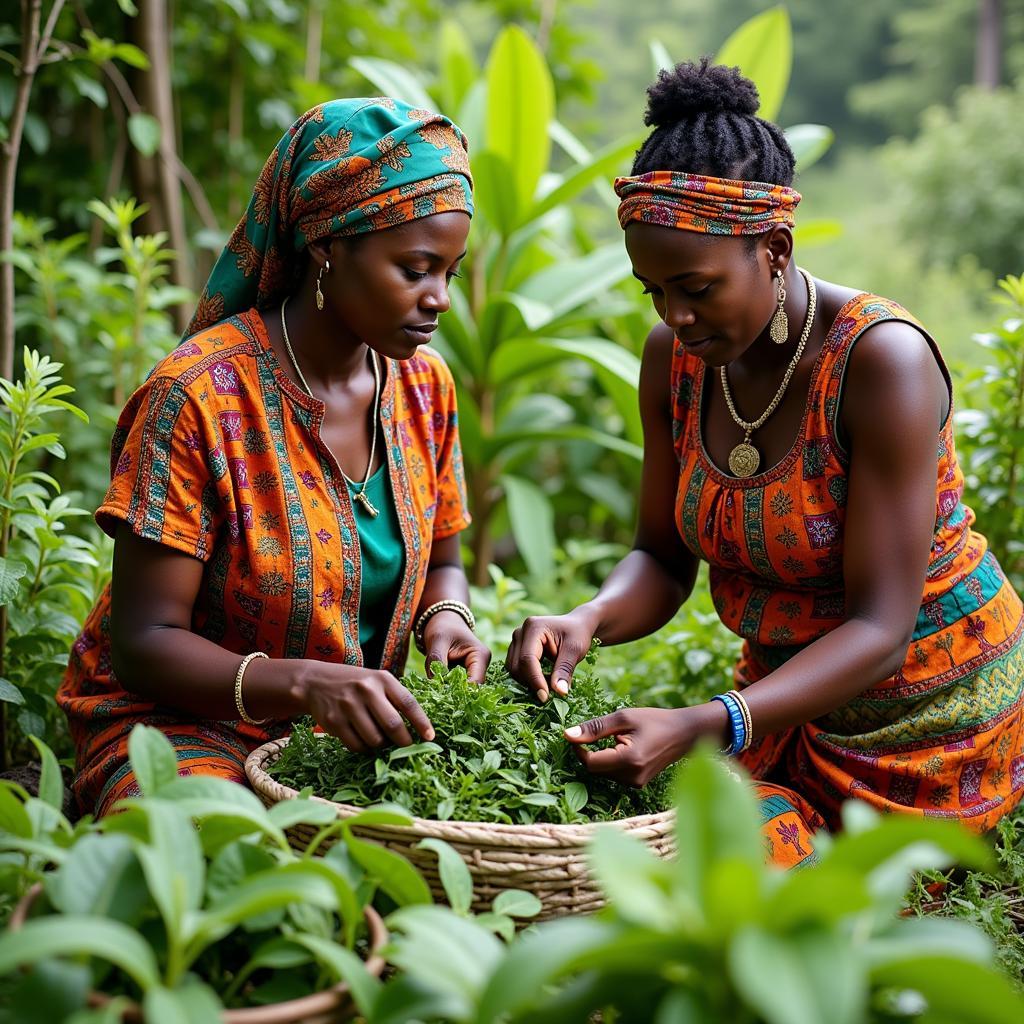 Women Collecting Herbs in a Traditional Medicine Garden
Women Collecting Herbs in a Traditional Medicine Garden
More Than Just Pretty Flowers: The Multifaceted Roles of Botanical Gardens
While the aesthetic beauty of African beautiful flowers is undeniable, African botanical gardens serve a much greater purpose than simply pleasing the eye. They play a critical role in:
- Conservation: Many African plant species are under threat due to habitat loss, climate change, and over-exploitation. Botanical gardens provide safe havens for endangered plants, acting as living gene banks for future generations.
- Research: Scientists in botanical gardens conduct vital research on plant taxonomy, ecology, genetics, and ethnobotany. This research contributes to our understanding of plant diversity, conservation strategies, and the development of new medicines and crops.
- Education: Botanical gardens serve as outdoor classrooms, educating the public about the importance of plant diversity, conservation, and sustainable living. They offer guided tours, workshops, and educational programs for all ages.
“Botanical gardens are vital for safeguarding Africa’s botanical heritage,” says Dr. Abena Agyemang, a renowned Ghanaian botanist. “They not only preserve endangered species but also empower local communities with knowledge and resources for sustainable plant use.”
Connecting with Nature and Culture
A visit to an African botanical garden is more than just a visual treat; it’s a journey of discovery, connecting visitors with the continent’s rich natural and cultural heritage.
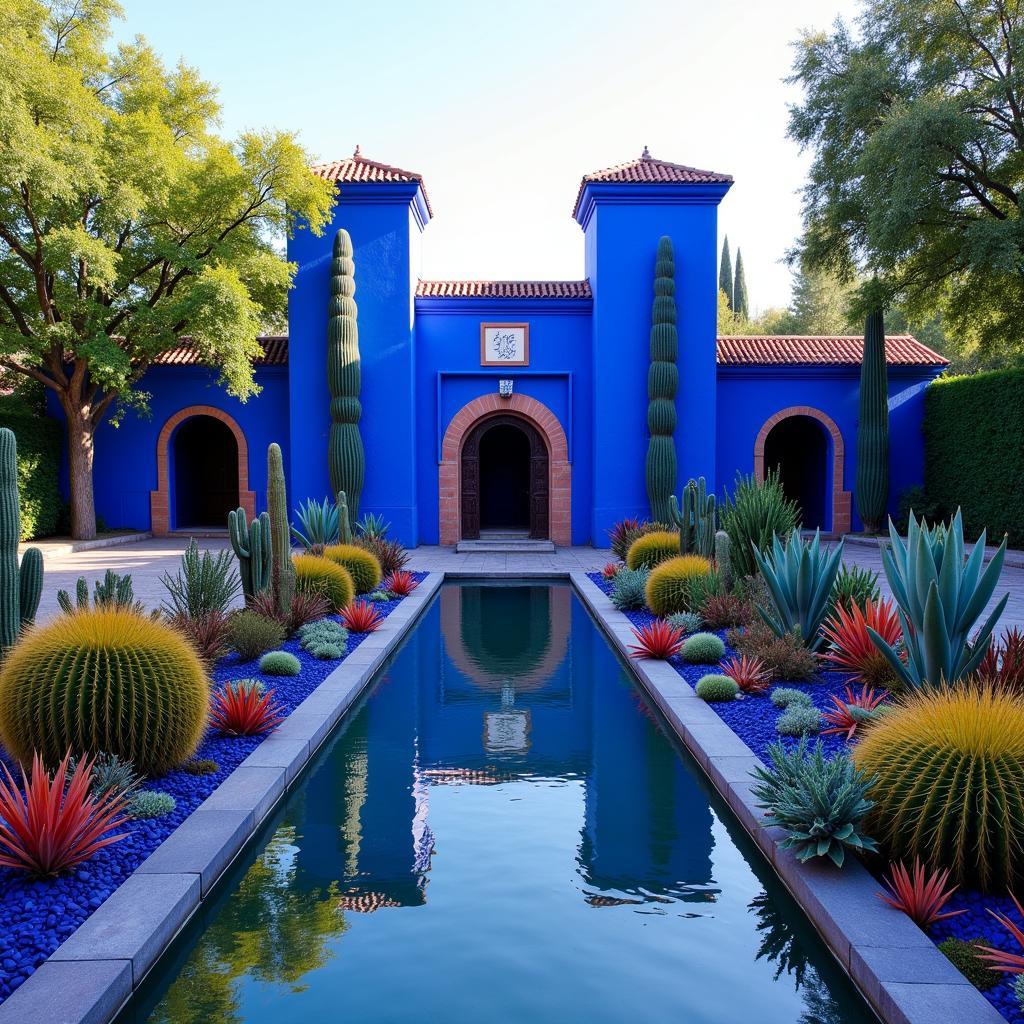 Jardin Majorelle in Marrakech, Morocco
Jardin Majorelle in Marrakech, Morocco
For many Africans, plants are not merely objects of beauty but are deeply intertwined with their cultural identity, spirituality, and daily lives. Traditional medicine, for example, relies heavily on the use of plants, with knowledge passed down through generations.
Planning Your Visit: Tips for an Enriching Experience
- Research Before You Go: Learn about the specific gardens you plan to visit, including their location, opening hours, entrance fees, and any special exhibits or events.
- Dress Appropriately: Wear comfortable shoes suitable for walking, as well as light clothing and a hat for sun protection. Remember to bring insect repellent, especially if visiting rainforest gardens.
- Take Your Time: Allow ample time to fully explore the gardens and appreciate the diversity of plant life. Don’t hesitate to ask questions and engage with the staff, who are often a wealth of knowledge.
African Botanical Gardens: Guardians of a Green Future
As the world faces unprecedented environmental challenges, the role of African botanical gardens has never been more critical. By preserving plant diversity, promoting sustainable practices, and fostering a deeper connection with nature, these gardens are helping to secure a greener and more sustainable future for generations to come. So, the next time you’re planning a trip to Africa, be sure to include a visit to one of these botanical treasures. You’ll be amazed by the beauty and wonder that awaits you.
FAQ
Q: What is the best time of year to visit African botanical gardens?
A: The ideal time to visit varies depending on the location and climate. However, many gardens are at their most vibrant during the rainy seasons when flowers are in full bloom.
Q: Are there botanical gardens in every African country?
A: While not every country has a dedicated botanical garden, there are numerous botanical gardens and arboretums scattered across the continent, representing diverse ecosystems.
Q: Can I purchase plants from African botanical gardens?
A: Some gardens have plant nurseries where visitors can purchase indigenous plants, seeds, or crafts. This helps support the garden’s conservation efforts.
You might also be interested in reading:
For any inquiries or assistance, please feel free to contact us:
Phone Number: +255768904061
Email: [email protected]
Address: Mbarali DC Mawindi, Kangaga, Tanzania.
We have a dedicated customer support team available 24/7 to assist you.

